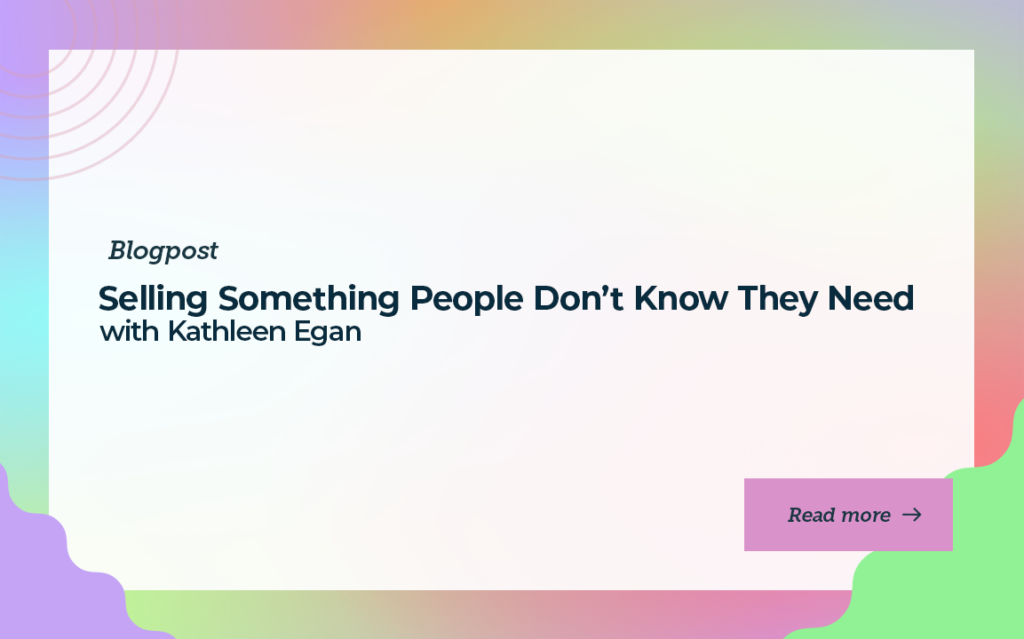Selling Something People Don’t Know They Need with Kathleen Egan

Sustainability in construction is no longer optional. It’s a business imperative. Large corporations and government agencies demand low-impact materials, pushing manufacturers and suppliers to adapt.
However, the complexity of sustainability standards, scattered data, and inconsistent reporting slow adoption.
Kathleen Egan, CEO of Ecomedes, appeared on the Predictable Revenue Podcast to share insights on how businesses can turn this complexity into a competitive advantage. The takeaway? When industries drown in fragmented data, those who simplify the process gain a massive edge.
Why Complexity Kills Sales (and How to Fix It)
Sustainability frameworks like LEED create structures for measuring building material impact, but also introduce friction. Manufacturers sell through distributors, reps, and project teams, making it difficult for buyers to access accurate sustainability data quickly.
This results in:
- Lost deals – Buyers move to competitors if sustainability data isn’t readily available.
- Slower adoption – Unclear compliance requirements discourage manufacturers from making sustainability investments.
- Mismatched priorities – Buyers focus on regulatory compliance, while sellers emphasize product differentiation, leading to misalignment.
The solution?
Businesses that streamline data improve transparency, simplify compliance, and remove friction from the buying process, winning more deals.
Solving Industry-Wide Pain Points
Egan’s co-founder, Paul, experienced this firsthand as a sustainability consultant. Frustrated by the repetitive, manual work of gathering data across manufacturers, he built his system to track and standardize information.
That system evolved into a scalable SaaS solution, which is now used by over 100 manufacturers and major buyers, including the U.S. Department of Energy and the Government of Canada.
This highlights a broader opportunity:
- For manufacturers – Make sustainability data easily accessible to eliminate purchase friction.
- For buyers – Simplify the process of evaluating and comparing sustainable materials.
- For tech-driven businesses – Create solutions that consolidate and standardize fragmented industry data.
Companies that remove obstacles instead of just adding features position themselves as indispensable.
Removing Barriers, Not Just Selling Features
When buyers are overwhelmed, they don’t need more information. They need faster decision-making paths. Whether it’s sustainability in construction, compliance in finance, or security in SaaS, sales success often comes down to making it easier for customers to say yes.
In industries where complexity is the biggest hurdle, the businesses that simplify, standardize, and remove friction will lead the market.
Compliance: From Cost Center to Sales Driver
For many industries, compliance is a necessary but frustrating hurdle. In commercial construction, sustainability requirements like LEED certification add complexity, often slowing down projects and inflating costs. However, it becomes a competitive advantage for companies that can simplify compliance.
1. The Compliance Bottleneck Creates Friction in Sales
Buyers demand sustainability, but the traditional process is inefficient:
- Manufacturers struggle to provide data at scale. Every customer asks for different certifications, requiring reps to dig through spec sheets and safety documents manually.
- Consultants are stuck in a cycle of rework. Gathering and verifying sustainability data takes weeks. Adding costs to both consultants and the manufacturers they work with.
- Buyers delay decisions because sustainability is complex. The harder it is to prove compliance, the more likely they are to deprioritize sustainability or delay projects.
2. Speeding Up Compliance = Closing Deals Faster
Buyers want sustainable products and workflows. The companies that remove friction from the buying process will win.
- Automating compliance checks removes sales barriers. Instead of a weeks-long process, platforms like Ecomedes instantly pull third-party sustainability certifications and run automated compliance logic. Turning a frustrating requirement into a seamless experience.
- Faster responses = competitive advantage. When manufacturers can instantly provide compliance documentation, they shorten sales cycles and differentiate themselves from competitors who still rely on manual processes.
- ROI isn’t just in cost savings. It’s also in deal acceleration. Clients using automation for sustainability compliance report time savings that translate to millions in recovered revenue opportunities.
3. Simplification is a Growth Lever
Sustainability compliance is just one example of a larger trend: buyers don’t just want a product. They want a path of least resistance. Companies that streamline complex processes through AI, automation, or integrations win more deals, reduce churn, and drive adoption.
For industries where regulations add friction to the sales process, removing complexity isn’t just an internal efficiency play. It’s a revenue strategy.
Validating the Problem Before Building
Ecomedes started by assuming that building owners and sustainability consultants needed an easier way to track and submit data for LEED certifications.
However, early conversations revealed a deeper challenge: manufacturers didn’t have clean, structured product data.
This insight reshaped the business model. Instead of just serving architects and consultants, the company pivoted to helping manufacturers organize their sustainability data first. This was crucial because the downstream processes (architect research, compliance tracking, building certifications) couldn’t be automated effectively without structured manufacturer data.
Customer Signals and Market Research
Rather than assuming they had the right solution, Ecomedes gathered multiple signals before scaling:
- Direct customer feedback from early manufacturer users who struggled with sustainability data.
- User behavior data from 50,000 monthly platform visitors. Measuring what features were actually used.
- In-tool surveys (though response rates were lower, they still provided insights).
- Industry research. Analyzing third-party certification trends and evolving compliance needs.
From Early Adopters to the Broader Market
Initially, the product was catered to by deep sustainability experts. A niche group of specialists fluent in the technical complexities of green building certifications. But this was too small a market to scale.
The next step? Simplifying the data for a much larger audience. Architects, general contractors, and corporate sustainability teams needed actionable insights, not raw certification details.
Key Takeaways for Founders
- Your first assumption is often wrong. Early customer conversations can reveal a deeper pain point than the one you originally planned to solve.
- Follow the data. Ecomedes didn’t just rely on surveys. They watched user behavior, iterated based on feedback, and refined the product accordingly.
- Scaling means simplifying. Niche early adopters might love complex details, but the mass market needs an intuitive, easy-to-use solution.
This shift from serving experts to making sustainability more accessible to the mainstream market is critical for any SaaS company looking to scale.
From Broad Awareness to Targeted Selling
Like many early-stage startups, Ecomedes initially cast a wide net to build awareness. But broad marketing wasn’t converting efficiently. The real shift came when they used their data to identify which manufacturers had the most urgent problems.
From Broad Marketing to Pain-Driven Targeting
Ecomedes indexed 10,000 manufacturers and created a pain index to rank them based on the following:
- The complexity of their product portfolio (more certifications = higher pain).
- The volume of third-party sustainability data they managed.
- Their go-to-market complexity (multi-tiered distribution, outside reps, etc.).
By prioritizing the highest-pain companies, they could focus on customers who were desperate for a solution. Leading to faster sales cycles and higher adoption rates.
Becky: The Bottleneck That Proved the Business Case
Every manufacturer had a Becky. The internal sustainability expert constantly fields manual data requests from sales reps, architects, and customers.
By digitizing Becky’s role, Ecomedes provided:
✅ Self-service access to sustainability data (reducing rep reliance on Becky).
✅ Analytics on demand signals. Which certifications, materials, and projects generated the most interest?
✅ Visibility into real buyer behavior, which was previously hidden due to manual processes.
This shift from an internal bottleneck to a scalable data hub made Ecomedes indispensable to its customers.
The Turning Point
Ecomedes knew they were moving toward stronger product-market fit when:
- Sales reps started using the tool without being trained or pushed.
- A small product update drove organic usage spikes, proving reps found value in it without Ecomedes forcing adoption.
- Customer support teams scaled usage internationally.
- Hewlett-Packard reps outside the U.S. began adopting the tool rapidly, tripling usage without direct sales efforts from Ecomedes.
This non-linear growth signaled that Ecomedes was no longer just a sustainability tool. It was enabling commerce.
Key Takeaways for Founders
✅ Data-Driven Targeting Wins – If you have access to industry-wide data, use it to prioritize high-pain customers instead of relying on broad marketing.
✅ Your Internal Champion is a Bottleneck. Digitize Them – If every company has an overworked “Becky” managing critical information, build a self-service platform that removes this friction.
✅ Adoption = Real Product-Market Fit – When users seek out and expand usage of your product without prompting, you’ve built something they need, not just something they were sold on.
Ecomedes’ shift from early adopters to mainstream adoption came from simplifying the tool, proving ROI, and letting organic adoption signals guide their next moves.
AI in Sales: Smart Automation or Just Hype?
Sales automation has become a buzzword, but as AI-driven outbound tools flood the market, the reality is more complex. AI can help with prospecting, writing outreach, and enriching data, but there’s a gap between what’s promised and what actually works. Kathleen shares her team’s real-world experience testing AI for outbound sales. What’s working, what’s not, and where the tech still falls short.
Automating the Tedious Parts
Running lean while scaling, Kathleen’s team turned to AI for prospecting, outreach, and data enrichment to avoid hiring a large marketing team. Some key wins:
✅ Data Enrichment – Instead of manually researching leads, they used ChatGPT to quickly verify and enrich contact details, industry fit, and sustainability focus.
✅ AI-Written Summaries – Ecomedes leveraged AI to auto-generate sustainability product descriptions, turning raw data into customer-ready content for sales proposals.
✅ LinkedIn Prospecting – AI-powered tools helped automate outreach, expanding their network even when initial contacts weren’t decision-makers.
These optimizations helped Ecomedes target accounts faster and made SDR workflows more efficient.
Where AI Fails
Not all AI solutions delivered. Some key breakdowns:
Poor Targeting & Lead Scoring
- AI tools struggled to distinguish commercial vs. residential manufacturers, forcing manual validation.
- Generic “lookalike” models often produced irrelevant leads, missing industry-specific nuances.
Lack of Decision-Making Intelligence
- AI can personalize outreach, but shouldn’t be trusted to select target accounts without human oversight.
- The best AI-driven outbound strategies combine human strategy with AI efficiency. Using AI to find new angles rather than fully automating decision-making.
Outreach Isn’t One-Size-Fits-All
- AI-generated sequences often miss the context of a buyer’s pain points.
Teams must manually refine messaging for different buyer personas to make outreach effective.
AI in Sales: The Right Way to Use It
Collin suggests a better way to leverage AI for outbound sales:
🔹 Use AI to surface new opportunities, not just clone existing customers.
🔹 Automate data collection, but keep human oversight on targeting and segmentation.
🔹 AI should augment SDRs, not replace them. Outreach is still about relationships and trust.
The takeaway? AI is powerful, but without strategy, it’s just another automation tool. The most effective sales teams use AI to enhance human judgment, not replace it.
Conclusion
Sustainability, compliance, and automation are only as valuable as their usability. Buyers don’t just need more data. They need faster, clearer paths to action. The companies that win are those that eliminate friction, not just add features.
For manufacturers, that means making sustainability data instantly accessible. For sales teams, it’s about leveraging AI to work smarter, not blindly automate. For founders, it ensures that every product decision simplifies, not complicates, the customer experience.
Want to simplify sustainability data and accelerate sales? Explore Ecomedes to streamline compliance and remove barriers for buyers.
Subscribe to the Predictable Revenue Podcast or learn how our services help B2B sales teams scale smarter.
NO TIME TO READ?
Listen On:


